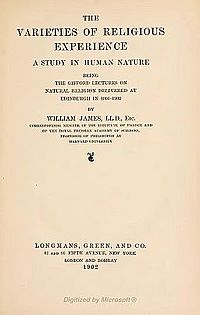steve_bank
Diabetic retinopathy and poor eyesight. Typos ...
Wiliam James' Verities Of Religious Experience

 en.wikipedia.org
en.wikipedia.org

The Varieties of Religious Experience - Wikipedia
It starts with a neurological view.The Varieties of Religious Experience: A Study in Human Nature is a book by Harvard University psychologist and philosopher William James. It comprises his edited Gifford Lectures on natural theology, which were delivered at the University of Edinburgh, Scotland between 1901 and 1902. The lectures concerned the psychological study of individual private religious experiences
